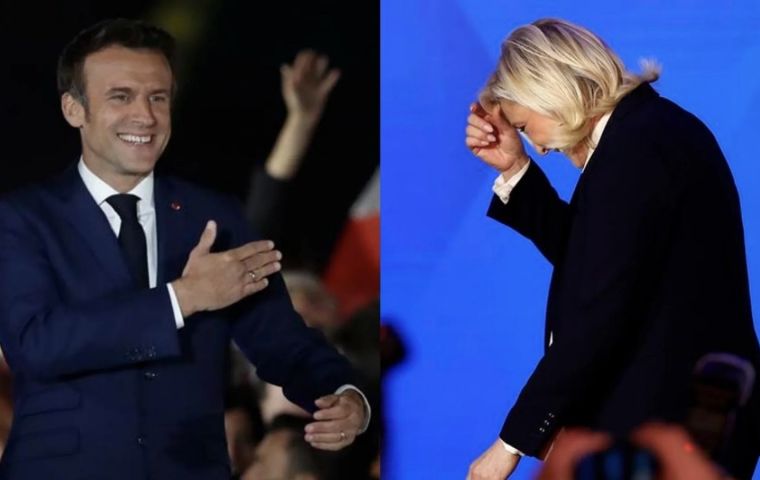MercoPress. South Atlantic News Agency
Five more years for Macron, but never with so many protest votes
 A part of the electorate rallied behind the slogan “Neither Macron nor Le Pen,” a catchphrase coined by groups of students between the election's two rounds
A part of the electorate rallied behind the slogan “Neither Macron nor Le Pen,” a catchphrase coined by groups of students between the election's two rounds Emmanuel Macron was reelected president of France on Sunday with 58,5% of votes cast against the 41,5% of Marine Le Pen. However, it can also be said that it was the victory of the less bad of the two candidates in the runoff, given the level of abstention rate, 28,1%, the highest since 1969.
A part of the electorate rallied behind the slogan “Neither Macron nor Le Pen,” a catchphrase coined by groups of students between the election's two rounds and which drew support despite the fundamental differences between the two candidates, as Macron reminded voters. He summarized the election as a referendum “For or against the European Union,” “For or against the environment” and “For or against our Republic”. Proof, then, of the trivialization of the far right for a large part of the electorate.
However it must not be forgotten that in the first round abstention reached 26,5%, with Macron garnering 27,85% of the vote, with all other candidates below the percentage of French citizens who preferred not to attend the polls. In effect Le Pen managed 23,1% and the hard left catch all Jean Luc Melechon, 21,95%.
Looking further back, the replay of the 2017 duel between the founder of La République en Marche (LRM) and the leader of the Rassemblement National (RN) has shaken the 'republican front' as never before. (The 'front républicain' is the term given to when people and parties across France's political spectrum rally together to defeat the far right.) Jean-Marie Le Pen's daughter, who obtained 33.90% of the vote five years ago, for the first time exceeded the threshold of 40% of the vote. This can be seen as proof of Emmanuel Macron's failure to fulfill a promise that he made the night of his previous victory on May 7, 2017, when he said that he would make sure that the French “no longer have any reason to vote for extremist parties.”
Macron's plan was thwarted by various crises − in particular the Covid-19 pandemic − coupled with the steady rise of the far right over the past 20 years, in France and abroad. His opponents on the right and left have even accused him throughout his five-year term of cynically seeking to strengthen Ms. Le Pen's position in the polls in order to facilitate his reelection.
After his short campaign in the first round, Emmanuel Macron threw all his strength into the battle between the two rounds. He managed to widen the gap with his opponent − something that the polls on the evening of April 10 hadn't predicted. He boosted his popularity by particularly targeting bastions of support for Jean-Luc Mélenchon, who came third in the first round. Nor was Macron afraid to go on the offensive during his debate with Le Pen.
Despite the failure of Ms. Le Pen's campaign ahead of the second round, which saw her fail to pick up all the potential votes in her grasp, she insisted to her detractors that she continues to move up the rankings in elections, even calling it a “resounding victory.”
“I will continue my commitment to France and the French,” she said on Sunday night, at the end of her third presidential campaign.
How exactly France's political landscape will be reconfigured will become clearer in the next few months, but it's now a match between the three main parties that emerged from the first round − Mr. Macron, Ms. Le Pen and Mr. Mélenchon. In fact, only Mr. Macron will not be able to be a candidate again in 2027, because the French Constitution limits him to two terms.
The fight for who will succeed him in his own party has now begun. But it will also be Mr. Macron's responsibility to stem the relentless rise of the far right. Never has there been such a large share of protest votes, between the Rassemblement National, La France Insoumise and voters who abstained. “Le coup passe si près que le chapeau tombe” (“The bullet passed so close that his hat fell off”) wrote Victor Hugo in his poem “After the Battle.” Mr. Macron must be careful that next time his head isn't taken with it.




Top Comments
Disclaimer & comment rulesCommenting for this story is now closed.
If you have a Facebook account, become a fan and comment on our Facebook Page!